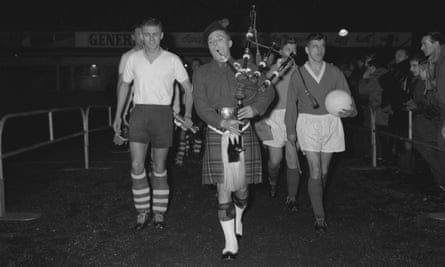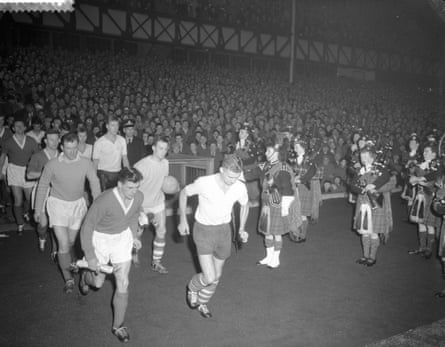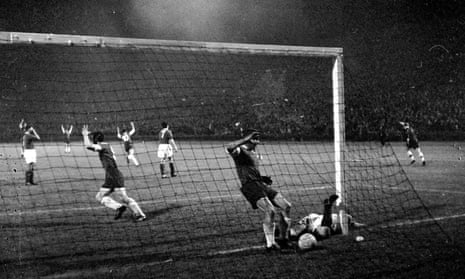Ah, the agony of choice. Would you prefer Real Madrid or Barcelona as your team’s opponents in the European Cup final? It was a question many Rangers fans were asking after their team avoided both the Spanish giants in the draw for the European Cup in 1960. So hypothetical would that question turn out to be, those same fans might as well have been pondering whether Alfredo Di Stéfano or László Kubala would make the better close-season signing for their club.
The omens that brought about such delusions during the balmy Glaswegian spring of 1960 were, admittedly, encouraging. By powering past the champions of Belgium, Czechoslovakia and Holland, Rangers had advanced to the sharp end of Europe’s premier tournament and now had the final in clear sight. The final was scheduled to be played in Glasgow, at Hampden Park, which would give them home advantage. The belief that a grand, celestial conspiracy was working in Rangers’ favour blossomed among supporters and the typically compliant west of Scotland media alike.
Drawing the unheralded West German champions Eintracht Frankfurt only encouraged this reckless thinking. A representative Frankfurt XI had visited London in the Inter-City Fairs Cup in 1956 and acquitted themselves well, but West German teams had made little impact in the early years of European competition. Frankfurt’s undistinguished path to the semi-finals did not suggest the trend would be reversed.
When Rangers manager Scott Symon asked: “Eintracht, who are they?” upon touchdown on German soil, it encapsulated the hubristic nature of Scottish over-confidence. What Symon and many Rangers fans failed to appreciate was the subtle difference between an easier draw and an easy draw. Frankfurt were undoubtedly the former but, unhappily for Rangers, they were some way from being the latter.

Frankfurt had a young, fit, hard-running side with a couple of veterans to supply the skill and guile. Their captain and longest-serving player was Alfred Pfaff. Approaching 34 at the time of the Rangers games, he was their Di Stéfano: a talented and intelligent inside-left who dictated play with his cultured left foot. Older still was 35-year-old Richard Kress, a former inside forward who had gradually adapted to become an effective right-winger during his seven years at Frankfurt. This pair would inspire Frankfurt’s pair of stunning, straight-set victories: 6-1 in the Waldstadion and 6-3 at Ibrox.
For much of the second half of the 20th century Scotland and its club sides failed miserably to marry a capacity for developing naturally gifted footballers with any ability to marshal them into organised and effective team units. Rangers probably had better players man-for-man than Frankfurt, and they had as many chances and more of the ball, yet they were comprehensively outthought tactically and picked apart at will on the counterattack.
Kress and Pfaff slowed the game down to walking pace to draw the Rangers defence high up the pitch, then arrowed balls into the space behind them and watched as Frankfurt’s fast wingers repeatedly scampered clear on goal. The quick and agile Erwin Stein at centre-forward proved another handful for a bewildered Rangers rearguard, as did Dieter Lindner with his clever runs into the box from deeper positions.
The return leg in Scotland followed the same pattern of Frankfurt sitting deep and counter-attacking too quickly for a ponderous and one-paced Rangers side to cope with. The Glaswegian giants had learnt nothing from the first-leg debacle. Rangers winger Alex Scott later admitted: “We only knew one way to play – to go forward.”
Erich Meier never established himself as a regular with Eintracht, but the left winger revelled in the space he was given at Ibrox, scoring two well taken goals and enjoying his best game in red and black. The stylish ease of the victories cannot be underestimated: this remains Rangers’ worst ever aggregate defeat in Europe. Only one other team, Real Madrid, have scored six goals against Rangers in a European tie. Frankfurt are still the only team to have scored six goals at Ibrox in a competitive game.

Rangers fans might have been desperate to skulk away quietly from such a beating but to their great credit the majority stayed and warmly applauded their opponents. Both matches had been played in a very good spirit and Frankfurt had been excellent visitors. Their party spent a few days before the game sightseeing locally and their politeness and friendliness had impressed the Scottish public.
Frankfurt too came away with only positive impressions of Scotland and the passion of Glaswegian fans – their players were staggered that 70,000 home fans turned up to watch what was, in essence, a dead rubber. At the final whistle the German players applauded the Rangers fans. The two sets of supporters swapped hats, scarves and rosettes. It was an example of the European football ideal of bringing nations together through football at its very best.
Many Rangers supporters and two generations of my own family were inspired to attend the final and support their new German friends. The general feeling was that after putting 12 goals past the mighty Gers, there was no way Frankfurt could lose to Real Madrid at Hampden – this wasn’t a glorious era for match predicting in Glasgow it must be said. The 134,000 crowd did witness a wonderful spectacle despite Frankfurt’s defeat and, while the 7-3 scoreline in favour of Real Madrid looked emphatic, Eintracht did take the lead and caused Madrid plenty of problems. Once again they drew appreciation from the Glaswegian crowd for their sportsmanship and spirit.

In October 1961, Queen’s Park unveiled a new £60,000 floodlight system for Hampden Park and the club’s chairman wanted a fittingly high-profile match to inaugurate the first “night of the lights”. Those dramatic, high-scoring games between Rangers and Frankfurt had so captured the Scottish public’s imagination 18 months earlier that it seemed an obvious choice to invite the clubs back to reprise their rivalry.
A crowd of just under 105,000 duly turned up to see if Rangers could gain some belated revenge in a game that looked like it might be closer fought. Rangers appeared stronger a year on with the addition of four players, among them a young Jim Baxter and the prolific Ralph Brand who had been injured for the European tie. Frankfurt, by contrast, appeared weakened by the absence of the influential trio of Pfaff, Lindner and Meier.
The Scots dominated the play for 70 minutes, peppered the Frankfurt goal with shots and inevitably lost once again. Kress drove home a left-foot shot from a corner after seven minutes and Lothar Schämer outpaced right-back Bobby Shearer 10 minutes later to make it 2-0. Brand missed several first half one-on-one chances for a Rangers side playing with little composure. When left-half Hermann Höfer volleyed a third past Billy Ritchie at the start of the second half, it looked like another tennis score would be on the cards. But Rangers finally found some assuredness in front of goal. Harold Davis drove two well-placed shots past Egon Loy in quick succession and the momentum suddenly swung back towards the de facto home side.
The clever Kress reduced the pace of the game to help tiring German legs and, despite Brand and Jimmy Millar both hitting the woodwork and forcing saves from the excellent Loy, Frankfurt held on to win 3-2. The players embraced warmly at the end and the two parties ate and drank late into the night at a Hampden post-match banquet laid on in their honour.
Rangers played Eintracht Frankfurt on one more occasion during the 1960s, when the German side came to Ibrox for a pre-season friendly in August 1967. In another exciting and free-scoring game, it was fourth time lucky for the Gers as they ran out 5-3 winners.
The four matches between the sides in the 1960s produced 29 goals and brought in more than 300,000 fans. The series also left two distinct legacies. The first was building long-standing relations between two clubs brought together by the power of European club football. The second was the acknowledgement by Rangers fans that, if there was indeed such a thing as a grand, celestial conspiracy afoot in the game, it would invariably be working against you rather than for you. Sixty years of Rangers forlornly chasing European football’s top prize has lent plenty of credibility to that theory.

Comments (…)
Sign in or create your Guardian account to join the discussion